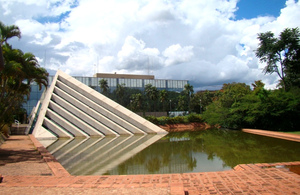The Reopening of the British Embassy in Tripoli
Your Excellencies, distinguished guests and colleagues, ladies and gentlemen.
Thank you all for attending our Queen’s Birthday Party this evening – the first we have held in Tripoli for eight years. And a special thank you to our sponsors: UK Solar Power, Velichor Risk, A1 Security Print, BACB and Petrofac.
We are gathered today to celebrate an historic occasion. On the 6 of February 2022, Her Majesty the Queen became the first British monarch to celebrate a Platinum Jubilee, marking seventy years of service to the people of the United Kingdom and her Commonwealth. Her remarkable reign began in 1952, only a year and two months after the formation of the United Kingdom of Libya.
Since then she has undertaken more than 260 official visits overseas. Her second-ever state visit was to Tobruk, where she met King Idris, who invested upon her the Order of Idris the First. Truly, throughout her entire reign, the Queen has borne witness to the vibrant enduring relationship between our two countries.
The relationship is deep and enduring. Our armed forces have fought together – in the Second World War and more recently against Daesh in Sirte. Since 2000, 166 Libyans have won Chevening Scholarships to study in the UK. Our cultural ties are strong, and continue to grow.
That is the past. In the present, it is my job – our job – to strengthen the bilateral relationship between the UK and Libya, and to support Libya’s people.
That is why I am delighted to announce this evening that the UK is today officially reopening our British Embassy here in Libya.
Although the Embassy is based in Tripoli, this is a demonstration of our commitment to the whole of Libya. I am proud that our work touches the lives of Libyans across the whole country already. For example:
- Law enforcement training in Benghazi, Sabha, Misrata and Tripoli;
- Mine Action projects in Sirte;
- Helping Libya’s English teachers through the British Council,
- Peacebuilding programmes in Ajdibaya, Tobruk and Zliten; and
- Our support for the High National Elections Commission throughout the country.
I am especially proud that British businesses are collaborating with Libyan companies and having a meaningful impact upon Libya’s economic development. Many of those businesses are represented here tonight, including UK Solar Power represented by Serag Elalam, who are leading the charge to increase solar energy in Libya.
But I would like to acknowledge that many friends and colleagues from across the country are unable to be here with us tonight, because of the ongoing political and security challenges Libya faces. I ask that you hold our absent friends from across Libya in your thoughts this evening.
If Libya is to fulfil her political and economic potential, Libya’s leaders must continue to implement the October Ceasefire Agreement, work together, and pursue compromise, cooperation and concord.
The people of Libya deserve this.
The Queen is our best example of such leadership. Throughout her 70-year reign, the Queen has devoted her life to public service, transcended politics and geography, and been a source of continuity and strength.
So please would you all raise a glass to Her Majesty the Queen on the occasion of her Platinum Jubilee. Your Excellencies, Ladies and Gentlemen. The Queen.
And now I am delighted to officially reopen the British Embassy in Libya through the raising of our Union Flag.
